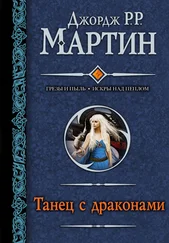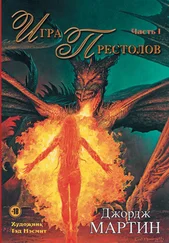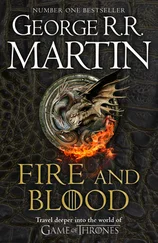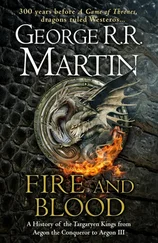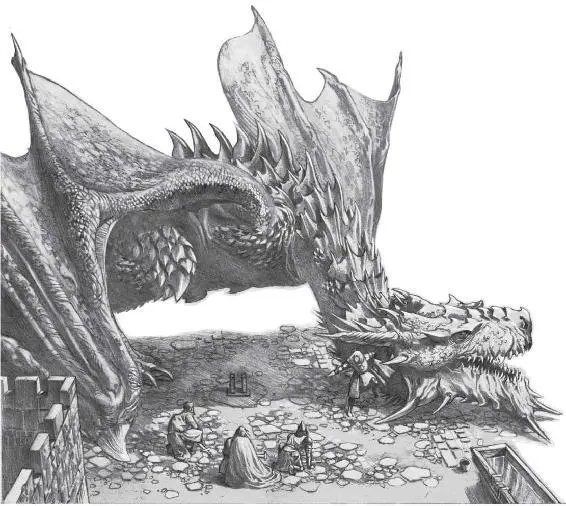
With the dungeons of the Red Keep full to bursting, the question arose as to what should be done with the prisoners. If Maegor were to be counted as usurper, then his entire reign was unlawful and those who had supported him were guilty of treason and must needs be put to death. Such was the course urged by Queen Alyssa. The Dowager Queen had lost two sons to Maegor’s cruelty and was of no mind to grant the men who had carried out his edicts even the dignity of a trial. “When my boy Viserys was tortured and slain, these men stood by silently and spoke no word of protest,” she said. “Why should we listen to them now?”
Against her fury stood Lord Rogar Baratheon, Hand of the King and Protector of the Realm. Whilst his lordship agreed that Maegor’s men were surely deserving of punishment, he pointed out that should their captives be executed, the usurper’s remaining loyalists would be disinclined to bend the knee. Lord Rogar would have no choice but to march on their castles one by one and winkle each man out of his stronghold with steel and fire. “It can be done, but at what cost?” he asked. “It would be a bloody business, one that might harden hearts against us.” Let Maegor’s men stand trial and confess their treason, the Protector urged. Those found guilty of the worst crimes could be put to death; for the remainder, let them tender hostages to ensure their future loyalty, and surrender some of their lands and castles.
The wisdom of Lord Rogar’s approach was plain to most of the young king’s other supporters, yet his views might not have prevailed had not Jaehaerys himself taken a hand. Though only ten-and-four, the boy king proved from the first that he would not be content to sit by meekly whilst others ruled in his name. With his maester, his sister Alysanne, and a handful of young knights by his side, Jaehaerys climbed the Iron Throne and summoned his lords to attend him. “There will be no trials, no torture, and no executions,” he announced to them. “The realm must see that I am not my uncle. I shall not begin my reign by bathing in blood. Some came to my banners early, some late. Let the rest come now.”
Jaehaerys as yet had neither been crowned nor anointed, and was still shy of his majority; his pronouncement therefore had no legal force, nor did he have the authority to overrule his council and regent. Yet such was the power of his words, and the determination he displayed as he sat looking down upon them all from the Iron Throne, that Lords Baratheon and Velaryon at once gave the prince their support, and the rest soon followed. Only his sister Rhaena dared say him nay. “They will cheer you as the crown is placed upon your head,” she said, “as once they cheered our uncle, and before him our father.”
In the end, the question rested with the regent…and whilst Queen Alyssa desired vengeance for her own sake, she was loath to go against her son’s wishes. “It would make him seem weak,” she is reported to have said to Lord Rogar, “and he must never seem weak. That was his father’s downfall.” And thus it was that most of Maegor’s men were spared.
In the days that followed, the dungeons of King’s Landing were emptied. After being given food and drink and clean raiment, the captives were escorted to the throne room seven at a time. There, before the eyes of gods and men, they renounced their allegiance to Maegor and did homage to his nephew Jaehaerys from their knees, whereupon the young king bade each man rise, granted him pardon, and restored his lands and titles. It must not be thought that the accused escaped without punishment, however. Lords and knights alike were compelled to send a son to court to serve the king and stand as hostages; from those who had no sons, a daughter was required. The wealthiest of Maegor’s lords surrendered certain lands as well, Towers, Darklyn, and Staunton amongst them. Others purchased their pardons with gold.
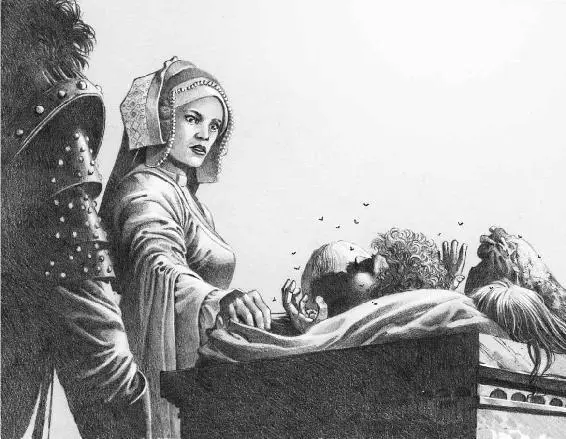
The royal clemency did not extend to all. Maegor’s headsman, gaolers, and confessors were all adjudged to be guilty of abetting Tyanna of the Tower in the torture and death of Prince Viserys, who had so briefly been Maegor’s heir and hostage. Their heads were delivered to Queen Alyssa, together with the hands they had dared raise against the blood of the dragon. Her Grace pronounced herself “well pleased” with the tokens.
One other man also lost his head: Ser Maladon Moore, a Kingsguard knight, who was accused of having held Ceryse Hightower, Maegor’s first queen, whilst his Sworn Brother, Ser Owen Bush, removed her tongue, during which Her Grace’s struggles caused the blade to slip, bringing about her death. (Ser Maladon, it should be noted, insisted the whole tale was a fabrication, and said Queen Ceryse died of “shrewishness.” He did, however, admit to delivering Tyanna of the Tower to King Maegor’s hands and standing witness as he slew her, so he had a queen’s blood on his hands regardless.)
Five of Maegor’s Seven yet survived. Two of those, Ser Olyver Bracken and Ser Raymund Mallery, had played a part in the late king’s fall by turning their cloaks and going over to Jaehaerys, but the boy king observed rightly that in doing so they had broken their vows to defend the king’s life with their own. “I will have no oathbreakers at my court,” he proclaimed. All five Kingsguard were therefore sentenced to death…but at the urging of Princess Alysanne, it was agreed that they might be spared if they would exchange their white cloaks for black by joining the Night’s Watch. Four of the five accepted this clemency and departed for the Wall; along with Ser Olyver and Ser Raymund, the turncloaks, went Ser Jon Tollett and Ser Symond Crayne.
The fifth Kingsguard, Ser Harrold Langward, demanded a trial by battle. Jaehaerys granted his wish and offered to face Ser Harrold himself in single combat, but in this he was overruled by the Queen Regent. Instead a young knight from the stormlands was sent forth as the Crown’s champion. Ser Gyles Morrigen, the man chosen, was a nephew to Damon the Devout, the Grand Captain of the Warrior’s Sons, who had led them in their Trial of Seven against Maegor. Eager to prove his house’s loyalty to the new king, Ser Gyles made short work of the elderly Ser Harrold, and was named Lord Commander of Jaehaerys’s Kingsguard soon after.
Meanwhile, word of the prince’s clemency spread throughout the realm. One by one, the remainder of King Maegor’s adherents dismissed their hosts, left their castles, and made the journey to King’s Landing to swear fealty. Some did so reluctantly, fearing that Jaehaerys might prove to be as weak and feckless a king as his father…but as Maegor had left no heirs of the body, there was no plausible rival around whom opposition might gather. Even the most fervent of Maegor’s supporters were won over once they met Jaehaerys, for he was all a prince should be; fair-spoken, open-handed, and as chivalrous as he was courageous. Grand Maester Benifer (newly returned from his self-imposed exile in Pentos) wrote that he was “learned as a maester and pious as a septon,” and whilst some of that may be discounted as flattery, there was truth to it as well. Even his mother, Queen Alyssa, is reported to have called Jaehaerys “the best of my three sons.”
It must not be thought that the reconciliation of the lords brought peace to Westeros overnight. King Maegor’s efforts to exterminate the Poor Fellows and the Warrior’s Sons had set many pious men and women against him, and against House Targaryen. Whilst he had collected the heads of hundreds of Stars and Swords, hundreds more remained at large, and tens of thousands of lesser lords, landed knights, and smallfolk sheltered them, fed them, and gave them aid and comfort wherever they could. Ragged Silas and Dennis the Lame commanded roving bands of Poor Fellows who came and went like wraiths, vanishing into the greenwood whenever threatened. North of the Golden Tooth, the Red Dog of the Hills, Ser Joffrey Doggett, moved between the westerlands and riverlands at will, with the support and connivance of Lady Lucinda, the pious wife of the Lord of Riverrun. Ser Joffrey, who had taken upon himself the mantle of the Grand Captain of the Warrior’s Sons, had announced his intention to restore that once-proud order to its former glory, and was recruiting knights to its banners.
Читать дальше
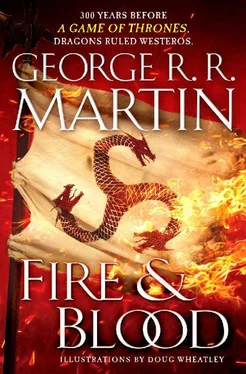



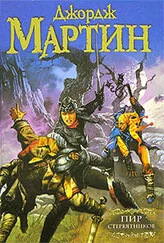

![Джордж Мартин - Сыны Дракона [лп]](/books/33039/dzhordzh-martin-syny-drakona-lp-thumb.webp)
